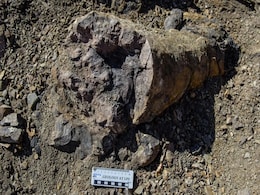Mass Extinction
- All
- News
- Videos
- Web Stories
-

444-Million-Year-Old Inside-Out Fossil Without Head And Legs Found In South Africa
- Wednesday April 2, 2025
- Written by Gadgets 360 Staff
Two fossils of an ancient arthropod named Keurbos susanae have been discovered in South Africa. The creature lived 444 million years ago during the Late Ordovician period. Its soft tissues, including muscles and guts, were found preserved but its shell, legs and head were missing. Researchers believe the species lived in low-oxygen conditions. The ...
-
 www.gadgets360.com
www.gadgets360.com
-

Fossil Evidence Shows Plants Survived the End-Permian Mass Extinction in China
- Tuesday March 18, 2025
- Written by Gadgets 360 Staff
Fossils discovered in China indicate that the End-Permian mass extinction, which wiped out 80% of life on Earth, may not have been as devastating for plants as previously thought. Researchers found evidence of gymnosperm forests and ferns in rock layers from this period, suggesting that some ecosystems remained intact. This discovery challenges ass...
-
 www.gadgets360.com
www.gadgets360.com
-

New Fossils Suggest Land Life Bounced Back Faster Than Expected After End-Permian Mass Extinction
- Thursday February 20, 2025
- Written by Gadgets 360 Staff
Fossil findings from the Heshanggou Formation in North China indicate that land ecosystems recovered faster than expected following the end-Permian extinction. While previous estimates suggested a prolonged uninhabitable phase, new research shows riparian zones may have stabilised within a shorter timeframe. Burrowing activity and plant regrowth su...
-
 www.gadgets360.com
www.gadgets360.com
-

69-Million-Year-Old Fossil Bird Skull in Antarctica Sheds Light on Waterfowl Evolution
- Monday February 10, 2025
- Written by Gadgets 360 Staff
Scientists have analysed a nearly complete fossilised bird skull found in Antarctica, dating back 69 million years. Identified as Vegavis iaai, the specimen is closely related to modern ducks and geese, with skull features supporting its classification as a waterfowl. Researchers suggest that its advanced vision and motor skills could have helped i...
-
 www.gadgets360.com
www.gadgets360.com
-

Supernova Remnant G278.94+1.35 is Closer to Earth, Claims New Study
- Friday January 10, 2025
- Written by Gadgets 360 Staff
Astronomers discovered that the supernova remnant G278.94+1.35 is located just 3,300 light years away, much closer than previously believed. Initially thought to span over 500 light years, it is now estimated to measure around 189 by 182 light years. Named "Diprotodon" after Australia’s extinct giant marsupial, this structure remains in an expand...
-
 www.gadgets360.com
www.gadgets360.com
-

One-Third of Earth's Species Could Face Extinction by 2100 Due to Climate Change
- Friday December 6, 2024
- Written by Gadgets 360 Staff
A new study has warned that up to a third of Earth's species could face extinction by 2100 due to rising global temperatures. The research, published in Science, highlights how climate change is accelerating extinction risks, especially for amphibians and species in isolated ecosystems. With emissions continuing at current rates, the risk of extinc...
-
 www.gadgets360.com
www.gadgets360.com
-

Conservation Expert Warns Earth Is In Midst Of Sixth Great Extinction: "We Don't Have Time Left"
- Monday November 18, 2024
- World News | Edited by Ritu Singh
The conservationist noted that the crisis, driven largely by human activity, threatens the survival of countless species and the delicate balance of ecosystems worldwide.
-
 www.ndtv.com
www.ndtv.com
-

Could a Supernova Threaten Earth’s Survival? Here's What You Need to Know
- Friday November 15, 2024
- Written by Gadgets 360 Staff
Supernova explosions have the potential to harm Earth’s atmosphere, particularly the ozone layer. However, no stars close enough to cause damage are currently identified. The risks are low, but gamma-ray bursts, caused by neutron star mergers, may pose an even greater threat in the future.
-
 www.gadgets360.com
www.gadgets360.com
-

Future Supercontinent Pangea Ultima Could Trigger Mass Extinction, Reveals New Study
- Wednesday November 6, 2024
- Written by Gadgets 360 Staff
A University of Bristol study warns that Earth’s future supercontinent, Pangea Ultima, may make the planet uninhabitable for humans and mammals. Due to a combination of rising CO₂ levels, increased solar radiation, and vast land area far from oceanic cooling, the supercontinent could experience widespread extreme temperatures. Though millions o...
-
 www.gadgets360.com
www.gadgets360.com
-

Continent Merger, Deadly Heat May Lead To Human Extinction: Study
- Tuesday November 5, 2024
- World News | NDTV News Desk
Extreme temperatures in future may potentially lead to the first mass extinction on Earth since the dinosaurs, a new study has revealed.
-
 www.ndtv.com
www.ndtv.com
-

El Nino and Massive Volcanic Eruptions Triggered Mass Extinction of Life 250 Million Years Ago
- Sunday September 15, 2024
- Written by Gadgets 360 Staff
The worst mass extinction in Earth's history, 250 million years ago, was triggered by extreme El Niño events and volcanic eruptions in Siberia. These eruptions released vast amounts of carbon dioxide into the atmosphere, causing severe climate changes. The warming environment led to the death of 90% of species on land and in the oceans. While this...
-
 www.gadgets360.com
www.gadgets360.com
-

Asteroid That Triggered Dinosaur Extinction Was a Carbon-Rich C-Type Space Rock, Study Finds
- Saturday August 17, 2024
- Written by Gadgets 360 Staff
Recent research has provided new insights into the asteroid that struck Earth 66 million years ago, causing a mass extinction event that led to the end of the dinosaurs. Scientists have now identified this impactor as a carbon-rich "C-type" asteroid, a type of space rock that likely originated in the asteroid belt between Mars and Jupiter.
-
 www.gadgets360.com
www.gadgets360.com
-

Pics: Climate Activists Launch 4-Day "Non-Violent" Mass Protest In London
- Saturday April 22, 2023
- World News | Agence France-Presse
Environmental campaign group Extinction Rebellion on Friday began four days of action in London, promising less disruption and more inclusion than the mass blockades that became its trademark.
-
 www.ndtv.com
www.ndtv.com
-

444-Million-Year-Old Inside-Out Fossil Without Head And Legs Found In South Africa
- Wednesday April 2, 2025
- Written by Gadgets 360 Staff
Two fossils of an ancient arthropod named Keurbos susanae have been discovered in South Africa. The creature lived 444 million years ago during the Late Ordovician period. Its soft tissues, including muscles and guts, were found preserved but its shell, legs and head were missing. Researchers believe the species lived in low-oxygen conditions. The ...
-
 www.gadgets360.com
www.gadgets360.com
-

Fossil Evidence Shows Plants Survived the End-Permian Mass Extinction in China
- Tuesday March 18, 2025
- Written by Gadgets 360 Staff
Fossils discovered in China indicate that the End-Permian mass extinction, which wiped out 80% of life on Earth, may not have been as devastating for plants as previously thought. Researchers found evidence of gymnosperm forests and ferns in rock layers from this period, suggesting that some ecosystems remained intact. This discovery challenges ass...
-
 www.gadgets360.com
www.gadgets360.com
-

New Fossils Suggest Land Life Bounced Back Faster Than Expected After End-Permian Mass Extinction
- Thursday February 20, 2025
- Written by Gadgets 360 Staff
Fossil findings from the Heshanggou Formation in North China indicate that land ecosystems recovered faster than expected following the end-Permian extinction. While previous estimates suggested a prolonged uninhabitable phase, new research shows riparian zones may have stabilised within a shorter timeframe. Burrowing activity and plant regrowth su...
-
 www.gadgets360.com
www.gadgets360.com
-

69-Million-Year-Old Fossil Bird Skull in Antarctica Sheds Light on Waterfowl Evolution
- Monday February 10, 2025
- Written by Gadgets 360 Staff
Scientists have analysed a nearly complete fossilised bird skull found in Antarctica, dating back 69 million years. Identified as Vegavis iaai, the specimen is closely related to modern ducks and geese, with skull features supporting its classification as a waterfowl. Researchers suggest that its advanced vision and motor skills could have helped i...
-
 www.gadgets360.com
www.gadgets360.com
-

Supernova Remnant G278.94+1.35 is Closer to Earth, Claims New Study
- Friday January 10, 2025
- Written by Gadgets 360 Staff
Astronomers discovered that the supernova remnant G278.94+1.35 is located just 3,300 light years away, much closer than previously believed. Initially thought to span over 500 light years, it is now estimated to measure around 189 by 182 light years. Named "Diprotodon" after Australia’s extinct giant marsupial, this structure remains in an expand...
-
 www.gadgets360.com
www.gadgets360.com
-

One-Third of Earth's Species Could Face Extinction by 2100 Due to Climate Change
- Friday December 6, 2024
- Written by Gadgets 360 Staff
A new study has warned that up to a third of Earth's species could face extinction by 2100 due to rising global temperatures. The research, published in Science, highlights how climate change is accelerating extinction risks, especially for amphibians and species in isolated ecosystems. With emissions continuing at current rates, the risk of extinc...
-
 www.gadgets360.com
www.gadgets360.com
-

Conservation Expert Warns Earth Is In Midst Of Sixth Great Extinction: "We Don't Have Time Left"
- Monday November 18, 2024
- World News | Edited by Ritu Singh
The conservationist noted that the crisis, driven largely by human activity, threatens the survival of countless species and the delicate balance of ecosystems worldwide.
-
 www.ndtv.com
www.ndtv.com
-

Could a Supernova Threaten Earth’s Survival? Here's What You Need to Know
- Friday November 15, 2024
- Written by Gadgets 360 Staff
Supernova explosions have the potential to harm Earth’s atmosphere, particularly the ozone layer. However, no stars close enough to cause damage are currently identified. The risks are low, but gamma-ray bursts, caused by neutron star mergers, may pose an even greater threat in the future.
-
 www.gadgets360.com
www.gadgets360.com
-

Future Supercontinent Pangea Ultima Could Trigger Mass Extinction, Reveals New Study
- Wednesday November 6, 2024
- Written by Gadgets 360 Staff
A University of Bristol study warns that Earth’s future supercontinent, Pangea Ultima, may make the planet uninhabitable for humans and mammals. Due to a combination of rising CO₂ levels, increased solar radiation, and vast land area far from oceanic cooling, the supercontinent could experience widespread extreme temperatures. Though millions o...
-
 www.gadgets360.com
www.gadgets360.com
-

Continent Merger, Deadly Heat May Lead To Human Extinction: Study
- Tuesday November 5, 2024
- World News | NDTV News Desk
Extreme temperatures in future may potentially lead to the first mass extinction on Earth since the dinosaurs, a new study has revealed.
-
 www.ndtv.com
www.ndtv.com
-

El Nino and Massive Volcanic Eruptions Triggered Mass Extinction of Life 250 Million Years Ago
- Sunday September 15, 2024
- Written by Gadgets 360 Staff
The worst mass extinction in Earth's history, 250 million years ago, was triggered by extreme El Niño events and volcanic eruptions in Siberia. These eruptions released vast amounts of carbon dioxide into the atmosphere, causing severe climate changes. The warming environment led to the death of 90% of species on land and in the oceans. While this...
-
 www.gadgets360.com
www.gadgets360.com
-

Asteroid That Triggered Dinosaur Extinction Was a Carbon-Rich C-Type Space Rock, Study Finds
- Saturday August 17, 2024
- Written by Gadgets 360 Staff
Recent research has provided new insights into the asteroid that struck Earth 66 million years ago, causing a mass extinction event that led to the end of the dinosaurs. Scientists have now identified this impactor as a carbon-rich "C-type" asteroid, a type of space rock that likely originated in the asteroid belt between Mars and Jupiter.
-
 www.gadgets360.com
www.gadgets360.com
-

Pics: Climate Activists Launch 4-Day "Non-Violent" Mass Protest In London
- Saturday April 22, 2023
- World News | Agence France-Presse
Environmental campaign group Extinction Rebellion on Friday began four days of action in London, promising less disruption and more inclusion than the mass blockades that became its trademark.
-
 www.ndtv.com
www.ndtv.com



















